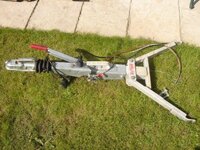H
Hugh Jardon
Deleted User
well i am on my way to getting my car a tow and car etc all set up
i picked up my car a tow aframe last night, got it from a chap in trurrororroooouo in cornwall.
it is the 1600kg model which is good
i also have ordered the pullbar kit from these guys
http://www.protowframes.co.uk/
hopefully i pick up the car around the 10/11/12 august so we will be all set then
quite exciting i must say
there is a thick metal cable with a d link on one end.....should this be fitted to the car tow point or to the motorhome?
it is braked so i have a brake cable connection point so that is fine
cheers
Link Removed
i picked up my car a tow aframe last night, got it from a chap in trurrororroooouo in cornwall.
it is the 1600kg model which is good
i also have ordered the pullbar kit from these guys
http://www.protowframes.co.uk/
hopefully i pick up the car around the 10/11/12 august so we will be all set then
quite exciting i must say
there is a thick metal cable with a d link on one end.....should this be fitted to the car tow point or to the motorhome?
it is braked so i have a brake cable connection point so that is fine
cheers
Link Removed


